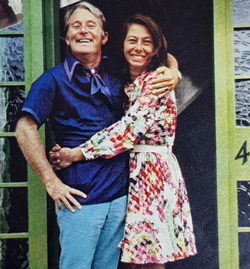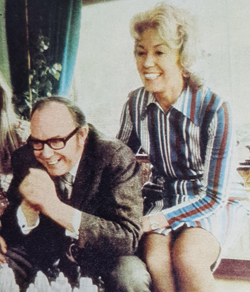The Wonderful Girls In Our Lives
1973 Article

Ernie and Doreen

Eric and Joan
It was their love that kept the act going through the lean years. And supporting them all the way was Eric’s mother, Sadie. Without her there might have been no double-act, as she explains....
Mrs. Sadie Bartholomew (Eric’s mother): There is something between Eric and Ernie that no - one will ever spoil. They have got to the stage where they can practically read each other’s thoughts.
When they first started the double-act it was agreed that whatever was earned was split straight down the middle. That holds today. No contract exists between them. Either could walk out tomorrow.
The origin of the double-act was accidental. The three of us were living and touring together during the early part of the war. Have you ever tried travelling with two fifteen year old discoveries in a compartment in the blackout, with both of them supercharged with adrenalin after a show? There wasn’t a minute’s peace for me. You couldn’t talk sense to either of them without them answering you back with some cheeky gag.
In sheer despair one night I said: “Now look, instead of all this malarky, why don’t you put your brains to some use? Try and do a double-act of your own. All you need are a few jokes and a song.”
“That’s an idea,” one of them said. And immediately they got down to planning it.
When the time came for their debut together as a double-act, Jack Hylton and I were standing in the wings. I can see the two of them there on the stage in the full glare of the lights, so very young but already such ardent and hardworking little troupers. The audience loved them. I was in tears.
Eric: An early problem was my stage name, Nobody liked Bartholomew and Wise.
One evening my mother was talking to Adelaide Hall, the coloured American singer on the bill, when her husband, Bert Hicks, came up.
My mother said: ‘We’re trying to think of a name for Eric.”
Bert was a big American Negro with a deep voice. He said: “A friend of mine calls himself Rochester because he comes from Rochester, Minnesota. Where do you come from?”
“Morecambe.”
“That’s a good name. Call him Morecambe.”
My mother liked it, and I liked it, and from there on I was Morecambe on the bill.
The show finally came to an end at Swansea. It happened suddenly after an air-raid, but business hadn’t been good for some time.
We held a council of war, my mother, Ernie and myself.
“We’ve got to do something,” I said. “Let’s head for London. We’ll be snapped up.”
“Boys,” said my mother, “it won’t be as easy as that. You are only employable as child discoveries, and there isn’t another discovery show going. Eric and I will go back to Morecambe, and Ernie will go back to Leeds. You can get yourselves jobs till you’re both older.”
“Jobs!”
Neither of us had done an honest day’s work in our lives. The very thought filled me with horror.
So I was dragged back to Morecambe where I was fed into Britain’s industrial war machine, doing a ten-hour day in a razor- blade factory for 17s. 6d. a week.
Back in Leeds, Ernie did a coal round with a friend’s dad who had a horse and cart.
Miserable, frustrated, we kept in touch. After three months of “real” work, Ernie came to stay with us in Morecambe. We thought we’d have a shot at getting into a seaside concert party. But no luck.
Ernie: The wonderful thing about being a double-act is that you’re never out on your own in the cold, cold world. Problems are things you share. In our case, we also had Eric’s mother who had faith in us and, against all advice, and during the worst possible period, she decided that her prodigies must come to London if they were ever to take the plunge into the world of professional variety.
We went to see an agent in Charing Cross Road, who said “Why don’t you go round to the Hippodrome on Monday? George Black is auditioning for his new show, Strike A New Note.”
We were going to knock George Black sideways. We gave him our full act, at nine minutes, and I’ll say this for him—he politely endured the agony. He went even further. He took us on.
As it happened, Strike A New Note was as smash hit, and the Morecambe and Wise “bits and pieces” were gradually cut, one after another. We soon accepted that and settled down to being what we really were, just glorified chorus boys, though we kidded ourselves we were on a higher level.
That whole experience opened a fantastic new world to us. We saw famous people in the audience, who later came backstage: Clark Gable, James Stewart, George Raft, Debora Kerr, Alfred Hitchcock, and many others.
For the first time in our lives we had a glimpse of West End night life. Girls in the show with rich daddies—and some were merely playing at show business as part of their war effort—invited us to stately homes in the country for the weekend. Wendy Toye, the show’s dance director, would take us back to her house in London for drinks, where we’d meet West End stars.
© Woman magazine 1973